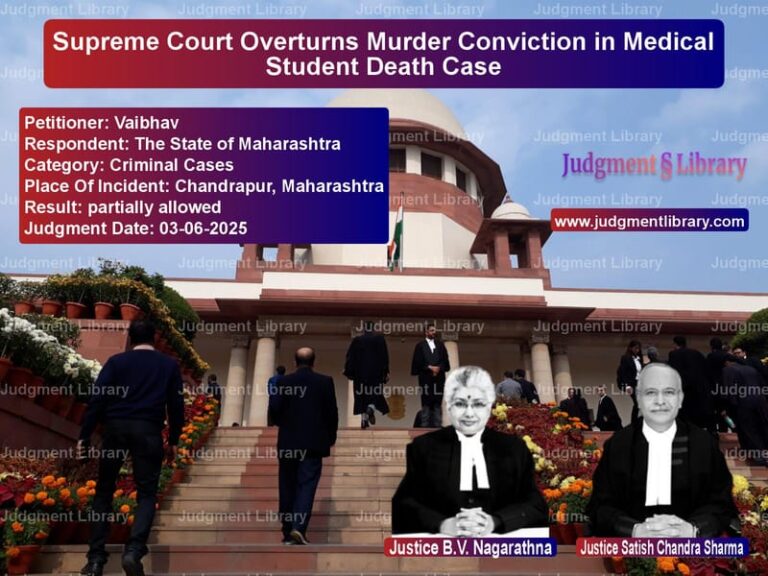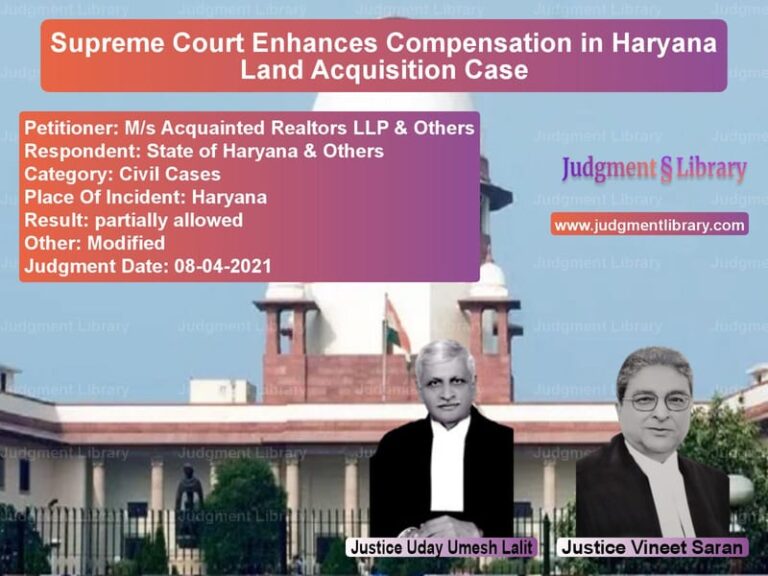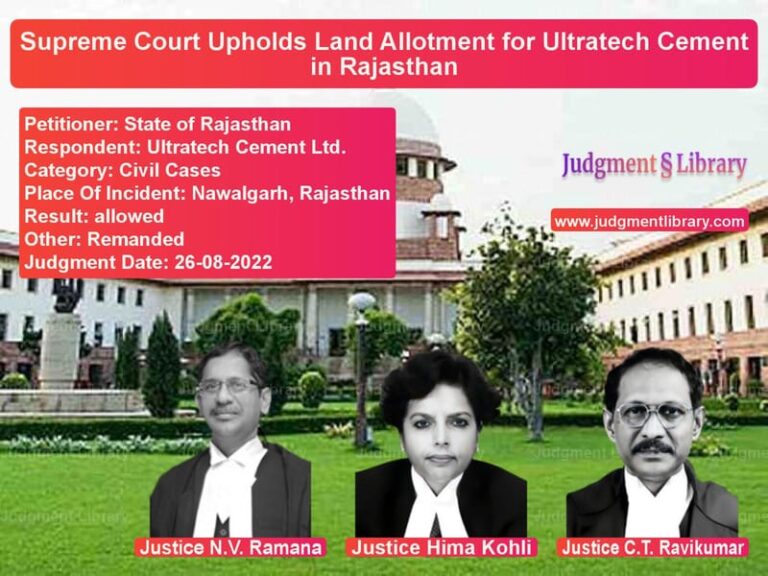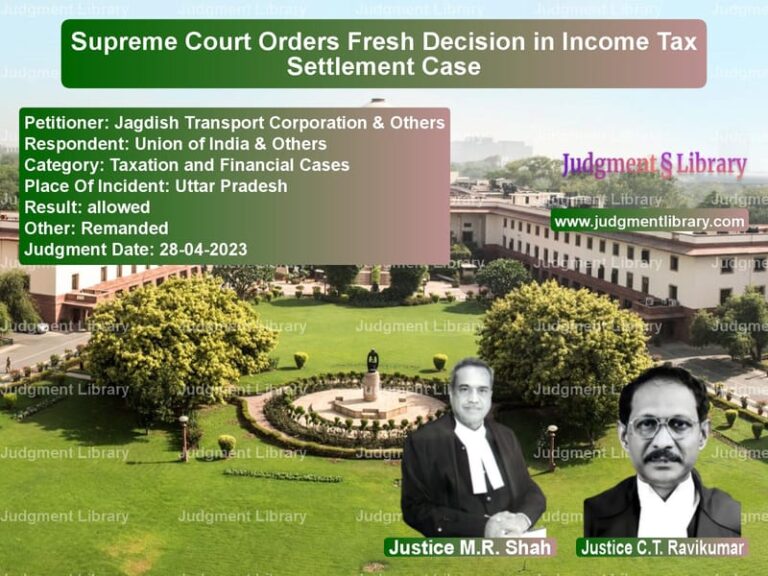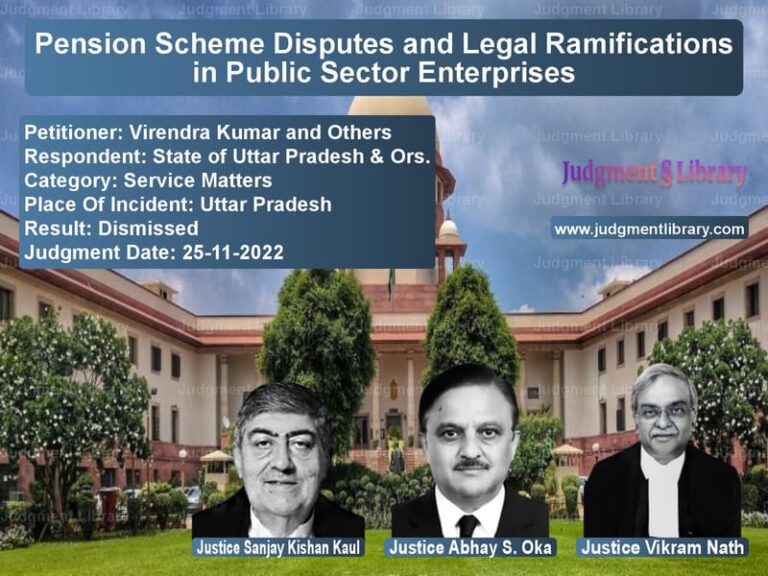Motor Accident Claim Restored: Supreme Court Grants Compensation to Victim’s Family
The case of Janabai Wd/o Dinkarrao Ghorpade & Ors. vs. ICICI Lombard Insurance Co. Ltd. revolved around a motor accident claim dispute. The Supreme Court was called upon to decide whether the Bombay High Court erred in rejecting compensation awarded by the Motor Accident Claims Tribunal (MACT) on the grounds of lack of proof regarding the involvement of the offending vehicle.
Background of the Case
The case pertains to a tragic accident that occurred on June 1, 2007. The deceased, Dinkar Shankarrao Ghorpade, was riding a motorcycle when a Maruti-800 car (bearing registration number MH-41/C-1777) allegedly crashed into him. He suffered serious injuries and succumbed to them on June 25, 2007.
The deceased’s wife, Janabai, lodged a complaint on July 2, 2007, which led to an FIR being registered against an unknown vehicle and driver. However, it was only on August 20, 2007, that the registration number and details of the alleged offending vehicle were discovered. Subsequently, the police filed a charge sheet against the driver, Sanjay S/o Ramesh Sonwane.
Seeking compensation under Section 166 of the Motor Vehicles Act, 1988, the deceased’s legal heirs filed a claim petition on May 8, 2009, before the MACT. The tribunal awarded Rs. 8,90,000 with interest at 7% per annum. However, the Bombay High Court overturned this ruling, leading the appellants to approach the Supreme Court.
High Court’s Reversal of the MACT Award
The High Court, while setting aside the tribunal’s award, noted:
- The claimants failed to examine the investigating officer to verify how they obtained details of the offending vehicle.
- The FIR initially mentioned an unknown vehicle, and the registration number was disclosed only in a supplementary statement.
- The claimants did not establish a direct link between the accident and the Maruti-800 car.
- The married daughters of the deceased were not included in the claim petition, raising doubts about its legitimacy.
Appeal Before the Supreme Court
The appellants challenged the High Court’s decision before the Supreme Court, arguing that:
- The High Court failed to consider that the primary concern of the family was the deceased’s medical treatment, not immediate legal formalities.
- Appellant No. 1 (Janabai) had testified that she was taken to the hospital in the same vehicle that hit them.
- The owner of the vehicle admitted that he had obtained bail for the accused driver and had taken custody of the vehicle.
- The High Court erroneously applied criminal trial standards to a civil claim petition.
Arguments Presented
Petitioner (Claimants) Arguments
- The claimants argued that the High Court erred in dismissing the compensation claim on technical grounds.
- They contended that the FIR was filed late due to the critical condition of the deceased and that procedural lapses should not defeat the rightful claim of victims.
- The owner’s admission of involvement in bail proceedings and custody of the vehicle strengthened the claim that the car was involved in the accident.
Respondent (Insurance Company) Arguments
- The insurance company maintained that the claimants failed to establish a direct connection between the accident and the insured vehicle.
- They pointed out discrepancies in the FIR and the subsequent identification of the vehicle.
- They argued that the burden of proof lay with the claimants and that the claim petition suffered from procedural shortcomings.
Supreme Court’s Analysis and Judgment
The Supreme Court examined whether the High Court was justified in dismissing the claim petition based on procedural lapses and lack of direct evidence linking the accident to the insured vehicle.
Key Observations by the Supreme Court
- The Court reaffirmed that proceedings under the Motor Vehicles Act, 1988, are summary in nature and do not require the same level of proof as criminal trials.
- It noted that the wife of the deceased had testified that the same car which hit them took them to the hospital, lending credibility to their claim.
- The owner of the vehicle failed to dispute the charge sheet filed against his driver or take legal action to exonerate his vehicle from the case.
- The Court observed that failing to include the deceased’s married daughters in the claim petition had no bearing on the validity of the claim.
Key Court Statement
“The rule of evidence applicable in a criminal trial cannot be applied while deciding a compensation claim under Section 166 of the Motor Vehicles Act. The approach of the High Court in this regard is unsustainable.”
Revised Compensation
While restoring the compensation claim, the Supreme Court also re-evaluated the amount based on legal precedents, particularly the Constitution Bench judgment in National Insurance Co. Ltd. vs. Pranay Sethi (2017). The recalculated compensation was as follows:
| Head | Amount (Rs.) |
|---|---|
| Loss of earnings (including future prospects) | 10,12,440 |
| Loss of estate | 15,000 |
| Spousal consortium (for wife) | 40,000 |
| Parental consortium (for two children) | 80,000 |
| Funeral expenses | 15,000 |
| Total Compensation | 11,63,000 |
Final Judgment
- The Supreme Court set aside the High Court’s ruling and reinstated the compensation claim.
- The revised compensation was set at Rs. 11,63,000 with 7% annual interest from the date of filing the claim until realization.
- The Court reiterated that technicalities should not defeat substantive justice in accident compensation cases.
Implications of the Judgment
This ruling has significant implications for motor accident claims:
- It reinforces that compensation claims under the Motor Vehicles Act should not be dismissed on hyper-technical grounds.
- It clarifies that claimants are not required to meet the stringent standards of proof applied in criminal cases.
- It affirms that courts must prioritize substantive justice over procedural flaws when adjudicating compensation cases.
- It provides clarity on the correct method of calculating compensation, ensuring victims’ families receive adequate financial relief.
Conclusion
The Supreme Court’s decision in this case ensures justice for accident victims and their families. It reaffirms that compensation claims should be decided on the principles of fairness and not be defeated by technical procedural lapses. By reinstating the claim and enhancing the compensation amount, the judgment sets an important precedent for similar cases in the future.
Petitioner Name: Janabai Wd/o Dinkarrao Ghorpade & Ors..Respondent Name: ICICI Lombard Insurance Co. Ltd..Judgment By: Justice Hemant Gupta, Justice Vikram Nath.Place Of Incident: Maharashtra.Judgment Date: 10-08-2022.
Don’t miss out on the full details! Download the complete judgment in PDF format below and gain valuable insights instantly!
Download Judgment: janabai-wdo-dinkarr-vs-icici-lombard-insura-supreme-court-of-india-judgment-dated-10-08-2022.pdf
Directly Download Judgment: Directly download this Judgment
See all petitions in Road Accident Cases
See all petitions in Compensation Disputes
See all petitions in Motor Vehicle Act
See all petitions in Judgment by Hemant Gupta
See all petitions in Judgment by Vikram Nath
See all petitions in allowed
See all petitions in Modified
See all petitions in supreme court of India judgments August 2022
See all petitions in 2022 judgments
See all posts in Accident Cases Category
See all allowed petitions in Accident Cases Category
See all Dismissed petitions in Accident Cases Category
See all partially allowed petitions in Accident Cases Category


